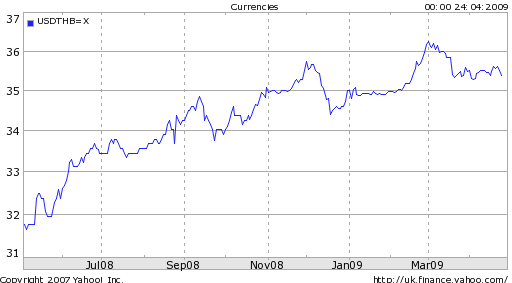April 27th 2009
Thai Baht Continues to Slide, but Unaffected by Political Turmoil
The value of the Thai Baht continues to erode, and the currency has now fallen 10% in the last year. It recently touched a two-year low against the Dollar. Weighing primarily on the Baht is the global economic crisis, so it is hardly unique in this regard. “The government has forecast the economy will contract by 3% this year, which would be the first time it has shrunk in more than a decade.”
Thailand’s economy is heavily reliant on exports, a category which also includes tourism. “The tourism council forecast revenue for the industry this year could drop 35 percent to only 350 billion baht in 2008,” and “The commerce ministry announced that Thai exports fell by 23.1 percent in March year-on-year, the fifth consecutive month of decline.” This is certainly the worst economic crisis to hit since the 1997 Southeast Asian economic crisis, but the country is in much stronger shape this time around. ” ‘Both at the national government level and in the private sector, the balance sheets are much stronger.’ ” As a result, Thailand has thus far managed to stave off a run on its currency, even despite a decline in investment- both direct and speculative. The Thai stock market is sagging; according to one commentator, “Fund flows could continue to drag the market down as we see profit-taking in this region.”
The government and the Central Bank are working in tandem to relieve the situation, but there isn’t much optimism surrounding their efforts. The Minister of Finance recently announced an (attempted) expansion of Thailand’s own version of an economic stimulus plan, to $40 Billion. Funding will be provided for “investment projects in a wide range of industries such as logistics, agriculture and energy. The Bank of Thailand recently slashes rates to 1.25%, tying a record low that was set in 2003.
However, “The decision to cut the rate by a quarter percentage point to 1.25 percent came as more than 40,000 protesters seeking to oust the government were massed in the capital Bangkok.” The political unrest in Thailand is old news at this point. It began over a year ago when then-Prime Minister Thaksin Shinawatra was ousted in a military coup. Since then, there have been an unending series of protests and counter-protests aimed at keeping him out or bringing him back. Basically, no one is happy with the current situation, but still there are no signs of political change. The Prime Minister has refused requests to resign, and Thaksin remains in exile outside the country.
The political uncertainty isn’t really weighing on the Baht, but one analyst warns this could change: “The baht is likely to underperform in the near term due to political tensions, which have prevented the government from undertaking aggressive fiscal stimulus.” In other words, while tourism has been impacted by the protests, the biggest problem is that the government is being hamstrung in its efforts to forge a strong response to the economic crisis.





April 28th, 2009 at 4:50 am
I believe that tourism in Thailand and the Baht will recover sooner than later. The economy is quite strong.
April 29th, 2009 at 5:30 am
This may be the repeat of the Asian Financial Crisis of late 1990s.